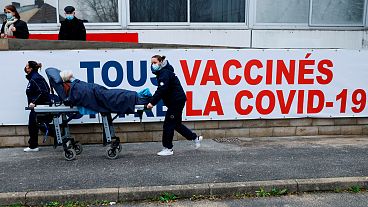The first ever UK-wide study involving 67 million people sheds light on what happened when COVID vaccinations were missed.
Between a third and half of the UK population didn't get the recommended number of COVID-19 vaccinations and boosters by the summer of 2022, according to an extensive new study.
A team from the University of Edinburgh and the Health Data Research UK (HDR UK) analysed anonymous data from the UK’s entire population of 67 million and found that over 7,000 severe outcomes could have been avoided with full vaccination.
"Our UK-wide analysis suggests that improved vaccination coverage during the pandemic would have been associated with fewer COVID-19 hospitalisations and deaths in the UK," stated the authors of the paper published in The Lancet.
Despite a vaccination rate of 90 per cent of the UK population over the age of 12 having received at least one dose in January 2022, the findings suggest that a significant portion of the population, ranging between one-third and one-half, was under-vaccinated in June 2022.
The specific percentages varied across regions, with figures of 45.7 per cent for England, 49.8 per cent for Northern Ireland, 34.2 per cent for Scotland, and 32.8 per cent for Wales.
Potential prevention of 7,180 hospitalisations and deaths
"Large-scale data studies have been critical to pandemic management, allowing scientists to make policy-relevant findings at speed. COVID-19 vaccines save lives," said in a statement Professor Aziz Sheikh, the study’s co-lead.
“As new variants emerge, this study will help to pinpoint groups of our society and areas of the country where public health campaigns should be focused and tailored for those communities," he added.
The prescribed vaccination schedule in effect during the study period included a single dose for individuals aged 5-11 years, two doses for those aged 12-15 years, three doses for individuals aged 16-74 years, and four doses for those aged 75 years and older.
The study revealed a clear correlation between under-vaccination and heightened rates of hospitalisations and deaths across all age groups studied.
Mathematical modelling points to a potential prevention of around 7,180 hospitalisations and deaths during the summer of 2022, had the entire UK population been fully vaccinated.
Specifically, individuals aged over 75 who were under-vaccinated were more than twice as likely to experience severe COVID-19 outcomes compared to their fully vaccinated counterparts.
"As the authors point out, these findings will help identify which groups should in future be specifically targeted to maximise uptake of vaccines for COVID and other infections. This will be particularly crucial in the event of another pandemic," said Dr Andrew Freedman from Cardiff University School of Medicine who did not take part in the study.
Useful method for other areas of medicine
Scientists underlined that their method which analysed the data of 67 million people could also be used in other fields as "the infrastructure now exists".
"We believe that we could and should extend these approaches to many other areas of medicine, such as cancer, heart disease and diabetes to search for better understanding, prevention and treatment of disease," said Professor Cathie Sudlow, Chief Scientist at HDR UK.
"One of the strengths of this study is the inclusion of data on the whole UK population – a remarkable achievement and one which will have applications in many other areas of health policy," said Freedman.



